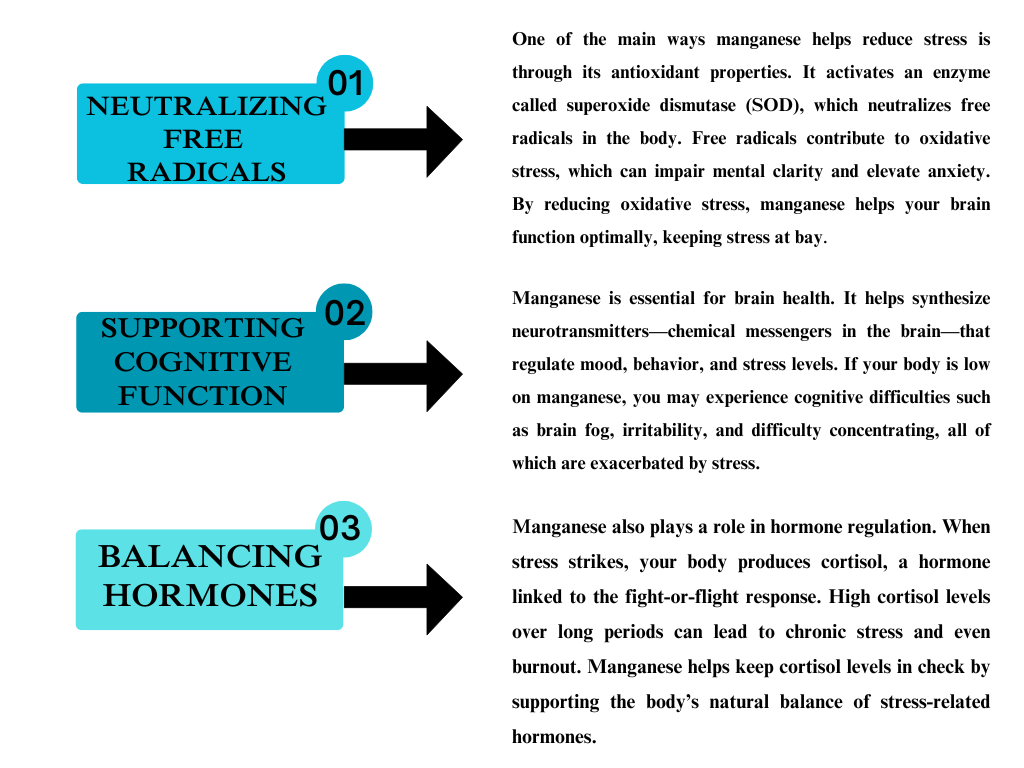Unlocking the Power of Manganese: How This Essential Mineral Helps Reduce Stress?
Stress has grown into an unwelcome friend for numerous individuals in today’s society. However, what if the key for reducing stress could lie in a mineral that has traditionally remained unnoticed—Essential Mineral manganese?
Manganese contributes an important role in how our body and mind look shortly after one’s self deals with stress. Let’s examine how this essential mineral might be your secret tool for alleviating stress and boosting mental health.
What Is Manganese and Why Is It Important?
Even though the body has only tiny quantities of this mineral, it is vital to our health. It is essential for a variety of essential functions, including as fortifying bones, enhancing the coagulation of blood, and—above all—lowering the level of oxidative stress. A surplus or shortage of free radicals in the body causes oxidative stress, which may damage cells and lead to issues with mental health along with additional medical issues.
A Brief History of Essential Mineral Manganese
For more than a century, people have been conscious of manganese, a mineral that was once valued for its vital function in the making of metal. Carl Wilhelm Scheele, a Swedish scientist, made the finding, and it soon became recognized as a crucial component of the production of steel. Nevertheless the significance for human health did not begin becoming evident until the 20th century.
Manganese was highlighted in early research as being essential to sustaining metabolic processes and building strong bones. As research advanced, scientists uncovered its vital role in brain function and its potential in combating oxidative stress—factors strongly related to mental wellness.
In addition to its commercial significance, manganese has become recognized as an essential part of mental as well as physical wellness.
How Essential Mineral Manganese Helps Combat Stress

Signs of Manganese Deficiency
The quantity of manganese in your typical diet may surprise you. The following are some noticeable signs of an absence that may be impacting your emotional well-being:
- Enlarged anxietyor stress
- Lethargy and low energy levels
- Moodiness or mood swings
- Cognitive issues such as poor memory or difficulty focusing
- Muscle hinders and weakness
Best Food Sources of Manganese
Making sure you get sufficient manganese can be as simple as including many key foods to your diet.
- Nuts and seeds: Almonds, sunflower seeds, and pecans
- Whole grains: Brown rice, quinoa, and oatmeal
- Leafy greens: Spinach and kale
- Fruits: Pineapple, blueberries, and blackberries
- Legumes: Chickpeas, lentils, and beans
Could Essential Mineral Manganese Additives Help with Stress?
Supplements can serve as an alternative if your diet fails to supply you enough Essential Mineral manganese. Before adding manganese supplements into your regimen, it is essential that you speak with your healthcare professional. Overdosing may result in toxicity and possibly harm to thenervous system.
Final Thoughts: A Small Change, A Big Impact
Manganese is essential for promoting balance between your body and mind, even though no single mineral can completely eliminate stress. One of the main causes of feeling overwhelmed is oxidative stress, which can be reduced by making sure your diet has appropriate manganese. Therefore, consider about the ways this tiny but powerful mineral might be the missing component in your stress-reduction toolset the next time life feels chaotic.
FAQs
1. Can manganese really reduce stress?
Yes,It has antioxidant properties that help diminish oxidative stress in the body.
2. How much manganese do I need daily?
The approved daily consumption for manganese differs in amount by age and gender, but for adults, it’s in most cases around 1.8-2.3 mg.
3. What are the risks of manganese deficiency?
A shortage of manganese may lead to enlarged stress, anxiety, fatigue, cognitive issues, and physical indications like muscle cramps.
4. Can I get enough manganese from food alone?
Yes, many daily foods like nuts, seeds, and leafy greens are rich in manganese.



